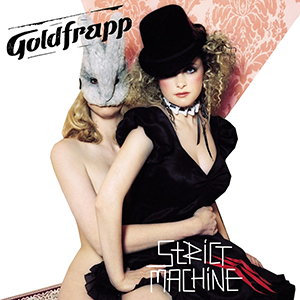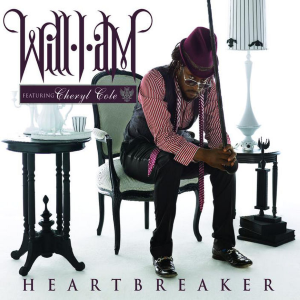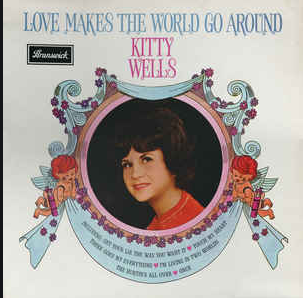Related Research Articles

"Heartbreak Hotel" is a song recorded by American singer Elvis Presley. It was released as a single on January 27, 1956, Presley's first on his new record label RCA Victor. It was written by Tommy Durden and Mae Boren Axton, with credit being given also to Presley.

Ellen Muriel Deason, known professionally as Kitty Wells, was an American pioneering female country music singer. She broke down a barrier to women in country music with her 1952 hit recording "It Wasn't God Who Made Honky Tonk Angels", which also made her the first female country singer to top the U.S. country charts and turned her into the first female country superstar. “It Wasn’t God Who Made Honky Tonk Angels” would also be her first of several pop crossover hits. Wells is the only artist to be awarded top female vocalist awards for 14 consecutive years. Her chart-topping hits continued until the mid 1960s, paving the way for and inspiring a long list of female country singers who came to prominence in the 1960s.

"Heartbreaker" is a song by American singer and songwriter Mariah Carey. It was released on September 21, 1999, by Columbia Records as the lead single from Carey's seventh studio album Rainbow (1999). The song was written by Carey and Shawn "Jay-Z" Carter, and produced by Carey and DJ Clue. Additional writers are credited, since the song's hook is built around a sample from "Attack of the Name Game" by Stacy Lattisaw. "Heartbreaker" pushed Carey even further into the R&B and hip hop market, becoming her second commercial single to feature a rapper. Lyrically, the song talks about a relationship from the female perspective, and how the protagonist incessantly returns to her lover, even though he continuously cheats on her and breaks her heart.

"I Can't Stop Loving You" is a popular song written and composed by country singer, songwriter, and musician Don Gibson, who first recorded it on December 30, 1957, for RCA Victor Records. It was released in 1958 as the B-side of "Oh, Lonesome Me", becoming a double-sided country hit single. At the time of Gibson's death in 2003, the song had been recorded by more than 700 artists.
"Heartaches by the Number" is a popular country song written by Harlan Howard and published in 1959. Sheet music for the song was a best seller in both the US and Britain in January 1960.

"Strict Machine" is an electronic dance song written by British group Goldfrapp and Nick Batt for their second studio album Black Cherry (2003). It was produced by Goldfrapp and describes laboratory rats in neuroscience experiments. Alison Goldfrapp read in a newspaper about experiments in which scientists stimulated rats' brains so that the rats would feel joy when following commands. She was inspired to write "Strict Machine" based on images of the experiment and "more human aspects of machines and sex and control". Actress Gwendoline Christie features on the record sleeve disguised in a rabbit mask.
Billboard Year-End charts are a cumulative measure of a single or album's performance in the United States, based upon the Billboard magazine charts during any given chart year. Billboard's "chart year" runs from the first Billboard "week" of December to the final week in November, but because the Billboard week is dated in advance of publication, the last calendar week for which sales are counted is usually the third week in November. This altered calendar allows for Billboard to calculate year-end charts and release them in time for its final print issue in the last week of December.

"Wooden Heart" is a song recorded by Elvis Presley and featured in the 1960 Elvis Presley film G.I. Blues. The song was a hit single for Presley in the UK Singles Chart, reaching No. 1 for six weeks in March and April 1961.

"Heartbreaker" is a song written by Carole Bayer Sager and David Wolfert, and recorded by American entertainer Dolly Parton. It was released in July 1978 as the first single and title track from the album Heartbreaker. The song topped the U.S. country singles chart, for three consecutive weeks, in mid-1978. "Heartbreaker" also peaked at #37 on the Billboard Hot 100 and #12 on the Easy Listening chart.

"Heartbreaker" is the second single from rapper will.i.am's third album Songs About Girls. The British single version features guest vocals from Cheryl Cole; this version was also featured on Cole's debut solo album 3 Words which was released in October 2009.
"It's Too Late to Love Me Now" is a song written by Gene Dobbins, Rory Bourke, and Johnny Wilson. Since its composition, the song has been covered as a single by various artists from the country and pop musical genres. It was first released as a single by country artist, Charly McClain in 1977.
The singles discography of Kitty Wells, an American country artist, consists of ninety singles, nineteen B-sides, and two music videos. In 1949 she was signed to RCA Victor Records, where she released her debut single, "Death at the Bar" also in 1949. Dropped from RCA in 1950, Wells signed with Decca Records and released the single "It Wasn't God Who Made Honky Tonk Angels" in 1952. The song was an answer song to Hank Thompson's hit, "The Wild Side of Life", spending six weeks at number one on the Billboard Magazine Hot C&W Sides chart. The single sold one million copies and made Wells the first female country artist to have a single reach number one on the Billboard country list. Until the end of the decade, Wells became the only woman on the country chart that would consistently receive radio airplay. In 1953 the song, "Paying for That Back Street Affair" reached #6 on the Billboard Hot C&W Sides list, as well as twenty one additional Top Ten singles on the same chart between 1953 and 1959. This included singles such as the Red Foley duet "One by One" (1954), "Making Believe" (1955), "I Can't Stop Loving You" (1958), "Mommy for a Day" (1959), and "Amigo's Guitar" (1959). The latter song was written by Wells herself and later won her a BMI Songwriter's Award.
The albums discography of Kitty Wells, an American country artist, consists of thirty-six studio albums, eleven compilation albums, and one box set. Wells' first album release was 1956's Country Hit Parade on Decca Records, which compiled her hits during her first four years of recording for the label. Prior to its release, many labels were reluctant to release albums by female country artists until Wells became the first female vocalist to sell records. Following its release, Wells and her label issued three studio albums during the 1950s: Winner of Your Heart (1957), Lonely Street (1958), and Dust on the Bible (1959). After the success of Wells' number one single "Heartbreak U.S.A." in 1961, an album of the same name was released the same year.
"Under Your Spell Again" is a song co-written and recorded by American country music artist Buck Owens. The song peaked at number 4 on the U.S. Billboard Hot Country Singles chart.

"How to Be a Heartbreaker" is a song by Welsh singer Marina and the Diamonds from her second studio album, Electra Heart (2012). It was released on 7 December 2012 by 679 Artists and Atlantic Records as the album's third and final single. Diamandis worked with Ammar Malik, Benny Blanco, Cirkut, Daniel Omelio, and Dr. Luke during the songwriting process, and enlisted Blanco, Cirkut, and Dr. Luke to oversee its production.

"Somebody's Heartbreak" is a song co-written and recorded by American country music artist Hunter Hayes. It was released in October 2012 as the third single from his debut studio album, Hunter Hayes. Hayes co-wrote the song with Andrew Dorff and Luke Laird. "Somebody's Heartbreak" is about an aspiring lover being invited to break this person's heart.

Heartbreak on a Full Moon is the eighth studio album by American singer Chris Brown. The album is a double-disc, consisting of 45 tracks, and was released digitally October 31, 2017, and onto CD three days later by RCA Records.

The Kitty Wells Show is a live album recorded at a concert by Kitty Wells, her son Bobby Wright, her husband Johnny Wright, singer Bill Phillips, and musicians Tommy Jackson, Paul Yandell and Odell Martin. The album was released in 1966 on the Decca label in the United States and on the Brunswick label in the United Kingdom.

Love Makes the World Go Around is an album recorded by Kitty Wells and released in 1967 on the Decca label in the United States and on the Brunswick label in the United Kingdom.
References
- ↑ Whitburn, Joel (2004). The Billboard Book Of Top 40 Country Hits: 1944-2006, Second edition. Record Research. p. 377.
- ↑ "Jeanne Black, "Heartbreak U.S.A." Single Release" . Retrieved November 26, 2016.
| This 1960s country song-related article is a stub. You can help Wikipedia by expanding it. |